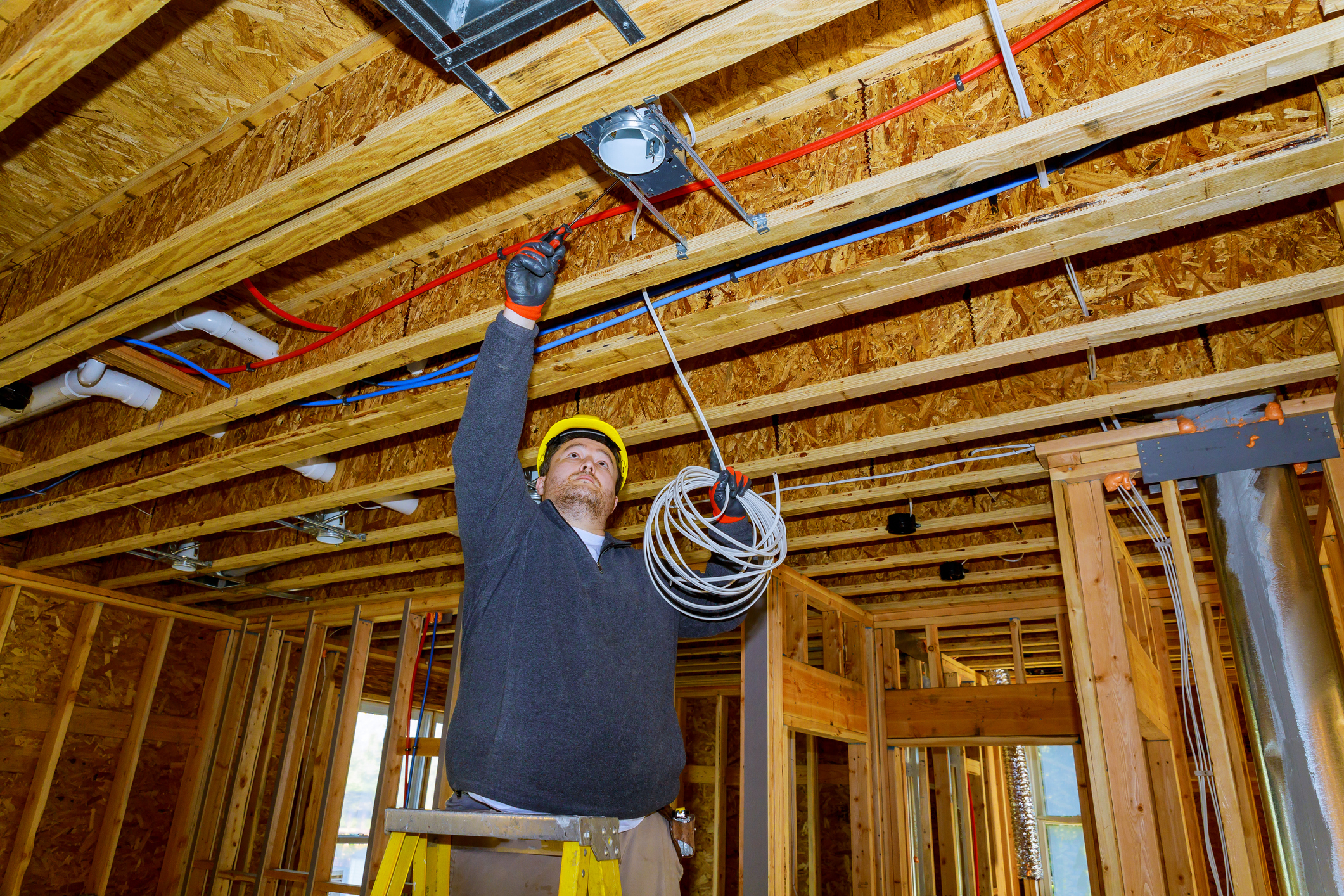Many homeowners hesitate to schedule electrical wiring for a new house, assuming the process will render the space unusable for extended periods. Questions like “How long will this take?” and “Will I need to repaint or replaster afterward?” often add to the hesitation. Understanding how long it takes an electrician to wire a house can help ease these concerns and allow you to plan ahead without unnecessary stress.
In this post, we’ll explore when and why this work is necessary, the risks of avoiding it, and what to expect during the wiring process. By the end, you’ll feel more prepared to tackle this important step with confidence.
When Is New Wiring Necessary?
Wiring a home is an essential job in two primary scenarios: building a new house or replacing outdated, unsafe wiring in an older home.
For New Homes:
If you’re building a home from scratch, wiring is one of the most critical stages of construction. The electrician installs everything from outlets to switches, lighting fixtures, and the electrical panel itself. A well-designed wiring system ensures your home meets code and functions efficiently for years to come.
For Older Homes:
If your home has outdated or damaged wiring — such as knob-and-tube systems or aluminum wiring — it may be time to replace it. Modern appliances and technology demand more power than older systems were designed to handle, which can lead to overheating, frequent breaker trips, or even electrical fires.
Risks of Delaying Wiring Work
Putting off wiring when it’s necessary can lead to:
Increased Fire Risk: Faulty or old wiring is one of the leading causes of house fires.
Higher Costs Later: Ignoring problems now may mean more extensive (and expensive) repairs down the line.
Safety Hazards: Exposed or deteriorating wiring puts your family at risk of shocks and other hazards.
How Long Does It Take an Electrician to Wire a House?
The time it takes to wire a new house depends on the size of the property, the complexity of the design, and the electrician’s scope of work. Here’s a general breakdown:
1. Small Homes (Under 1,500 sq. ft.)
For smaller homes, wiring typically takes 3-5 days. This timeline includes installing outlets, switches, light fixtures, and the electrical panel.
2. Medium-Sized Homes (1,500-3,000 sq. ft.)
Wiring a medium-sized home may take 1-2 weeks, depending on the number of rooms, appliances, and additional systems like HVAC wiring or home automation.
3. Large Homes (Over 3,000 sq. ft.)
For larger homes, the process can extend to 2-4 weeks. Homes with custom features like smart systems, entertainment setups, or outdoor lighting may require additional time.
Other Factors That Influence Timing:
Accessibility: Easy access to walls and ceilings makes the job faster.
Special Features: Extra time may be needed for custom installations or complex systems.
Permit Approvals: Some local regulations require inspections at various stages, which can add time to the project.
What To Expect During The Process
Here’s what happens when electricians wire your home:
Step 1: Planning and Preparation
The electrician assesses the layout, discusses placement of outlets and switches with you, and ensures the design complies with electrical codes.
Step 2: Rough-In Wiring
In new builds, this stage involves installing wiring behind walls and ceilings before drywall or insulation is added. In existing homes, electricians may need to cut into walls or ceilings to access older wiring.
Step 3: Connections and Fixtures
Once the rough-in is complete, the electrician connects the wires to outlets, switches, and the breaker panel. Light fixtures, appliances, and specialty systems are also installed during this phase.
Will I Need To Repaint Or Replaster?
If you’re wiring a new house, you won’t need to worry about repainting or replastering because the electrical work is completed before finishing surfaces like drywall are installed.
For existing homes, it depends on the scope of work. In some cases, electricians can fish wires through existing walls with minimal damage. However, if more extensive access is required, you may need to repair or repaint small sections of walls or ceilings. Discuss this with your electrician beforehand to understand what to expect.
Tips To Plan Ahead
Clear the Workspace: Remove furniture and belongings from areas where the electrician will work.
Ask About Permits: Ensure your electrician pulls the necessary permits before starting.
Plan Around Inspections: Allow time for any inspections required by local regulations.
Trust the Professionals For Safe & Efficient Wiring
Knowing how long it takes an electrician to wire a new house can help you plan your project with ease. Whether you’re building a home from the ground up or updating outdated wiring, proper electrical work is essential for safety and functionality.
If you’re in or near Prescott, Ontario, Beattie Dukelow Electrical Inc. is here to help. Our experienced team provides expert wiring services tailored to your home’s needs. Contact us today to learn more and schedule your project.

